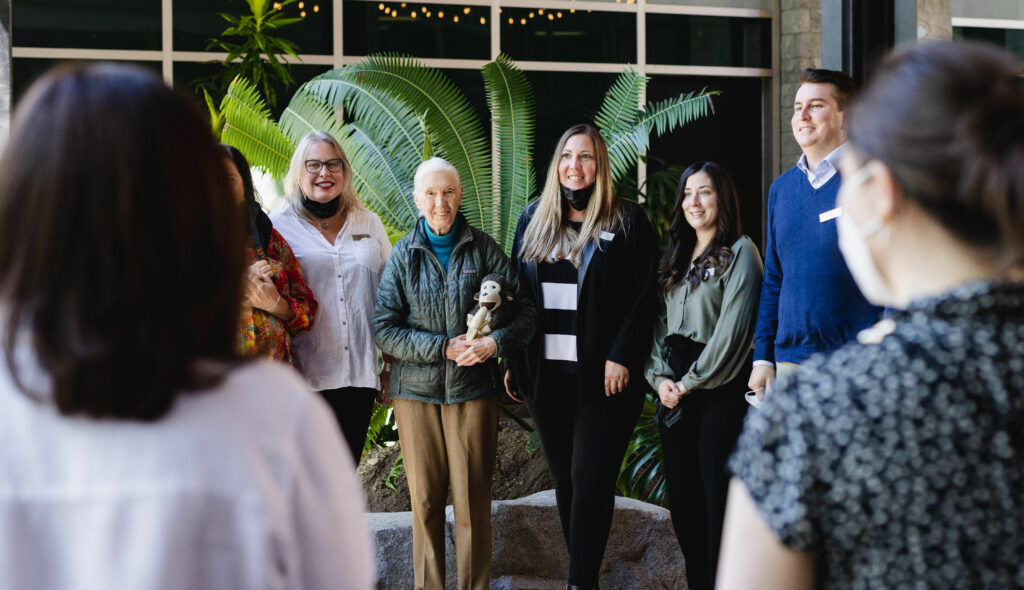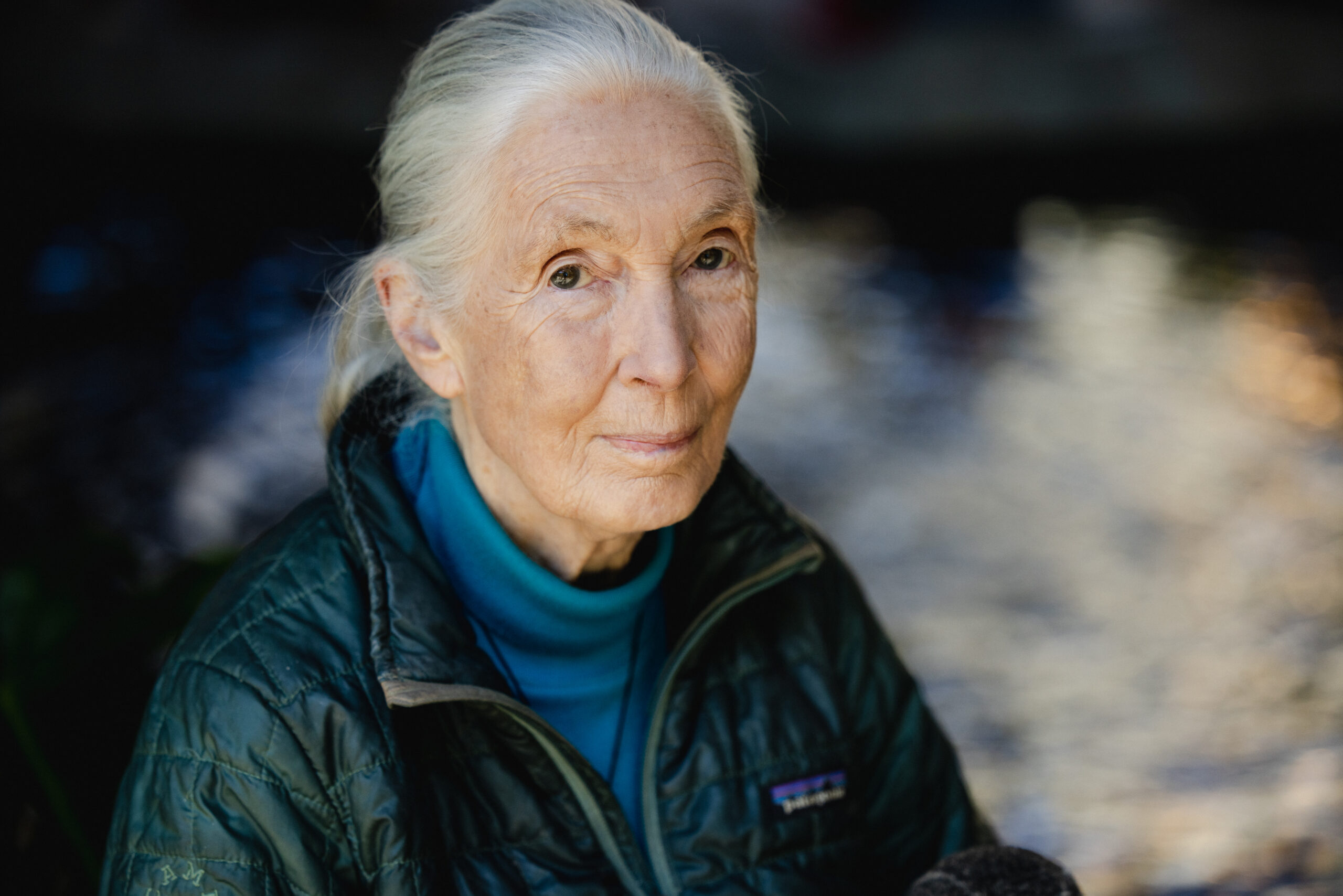
‘Afraid of the water’? Life in a city that dumps billions of litres of raw sewage into lakes and rivers
10 billion litres of sewage are dumped into Winnipeg’s lakes and rivers each year. Some...
When Jane Goodall visited Victoria earlier this year, she had an air of serenity about her. The octogenarian began to walk on-stage in front of a sold-out crowd, leaning on an assistant’s shoulder and using a cane to assist her. But then she abruptly hopped across the stage, lithe as can be — no cane necessary.
“That was poor 88-year-old Jane Goodall,” she quipped from the mic.
The world’s best-known naturalist isn’t slowing down for anyone or anything — least of all her age. But when I caught up with her five months after her visit to Victoria, via Zoom, she seemed a little weary of all of her time on the road.
Bundled up in a turtleneck and puffy jacket, she told me that wherever she goes she tries to find a little pocket of nature — even in downtown L.A., where she was travelling at the time of our call.
“If I go to a hotel, and there’s one tree, I will sometimes move my whole bed around so that I can just be there and see the tree,” she said. “A little bird comes on the palm tree outside the window. I like it.” Despite her attempts to find these little pockets, a day spent in nature “doesn’t happen very often,” she said — in part because of her relentless schedule to spread the message she learned from observing chimpanzees in their natural habitat.
That message — that we are part of and not separated from the animal kingdom and that we all have a part to play in saving our planet — is arguably more important now than ever before, as the world grapples with runaway climate change and the sixth mass extinction in history.
“The absurd thing is the idea that’s been prevalent in economics for so long, that you can have unlimited economic development everywhere. But the planet has finite natural resources,” she said. “We can’t go on demanding more and more … So we have to have a different kind of business and a different kind of economy and a different definition of success.”
I chatted to Goodall about how she stays hopeful, Zoom fatigue and the dramatic changes to the natural world she’s witnessed during her lifetime.
Well, it’s very obvious. If you just look around the world, then you can’t help but lose hope. I mean, you have feelings of helplessness and hopelessness. If you look at what’s happening politically, socially, environmentally. You’ve got the war with Ukraine, there’s major loss of biodiversity, we’re still losing forests, we’ve got industrial agriculture poisoning the land and soil, with its pesticides and herbicides damaging biodiversity. And so, you know, the picture globally is grim. And you can’t look around and not feel sort of despairing. So when people come to me and say, they’re losing hope, or they’ve lost hope, I say, ‘Well, you know, stop looking all around the world, just think about where you are, or some project that you really care about, and roll up your sleeves and do something about that.’
Well, I’ve been in a situation. I don’t know if it’s losing hope, but feeling desperate, because things had gone so wrong. Like when four of my students were kidnapped, and all the funding melted away from Gombe, and it looked as though it would have to be closed. And I knew that that could not be. So I had to go around with my hat in my hand, at the same time as finding a new executive director for the Jane Goodall Institute in the U.S. It just seemed hopeless. But we managed to steer through. And that was a pretty bad time. But I don’t think I’ve ever lost hope. I’ve been with my back against the wall. But that makes me determined to fight.


Yes, into action. Because being angry and depressed isn’t helping anything. And feeling angry, yes, one of course feels angry. And then you can channel that anger into making a difference. And the same when you feel kind of desperate and depressed.
Not really. I mean, I’ve made mistakes. But you know, we all make mistakes. And I’ve tried to learn from them. I suppose, in a way, I wish my first marriage had lasted but it couldn’t. So that was a shame for my son particularly. But that’s life. It just wasn’t working. And so it had to end. But apart from that, I don’t think I’ve had major regrets. I mean, I’ve done things that were silly, and had to go back and redo them.
Massively. I just need to think of the house I grew up in. Me and my sister, we own it, she lives there with her family, and I go back between trips. And I would say, 50 per cent of the birds that I knew around that area as a child have gone, due mostly to herbicides and pesticides on people’s lawns, the proliferation of roads and traffic. They used to have hedgehogs. Gone. No more hedgehogs around there anymore. And when I was a child, if you opened the windows at night, then with the light on, your room was filled with bugs of all sorts. Now I get excited if one moth comes in — the insects have just gone. And that, of course, is one of the reasons why we’ve lost birds. So just in that one place, I’ve seen the result of loss of biodiversity.
Well, I wish they would do more than make pledges. And somehow, we could find a way of having them actually do what they say they’re going to do. Because so many of the COPs have been all these wonderful pledges. And if you go back to the Paris Agreement, I don’t think any country lived up to what they promised in the way of emissions. So I don’t know. I mean, one always hopes. I think the main thing that goes on at these COPs is the networking that goes on and brings groups all passionate about the same area of conservation getting together, agreeing to collaborate, because it’s collaboration that we need, if we’re going to reverse climate change and loss of biodiversity. And those two go together, because climate change is definitely affecting the loss of biodiversity.
Well, for one, I actually visited the re-greening of Sudbury. I was there as part of an IMAX film. I was there before, and the change was enormous. So that’s very exciting. And then I know that the Jane Goodall Institute of Canada is doing an awful lot of work with Indigenous people. And they’re using the approach of community-led conservation that we use all over the world, that they’re trying to get protection for more and more of the Indigenous lands.

Well, lots of people said it must have been lovely during the height of COVID to be at home and stop travelling. I’ve never ever been as exhausted in my entire life, because I was doing up to four Zooms a day, all around the world. And my voice has never recovered. It just got so overused. So it was virtual conferences, virtual lectures, virtual panels, then it was messages. It was stuff for the different Jane Goodall Institutes — 27 of them. And it was just nonstop. I didn’t have one day off. I didn’t have one weekend off. I didn’t have one holiday. We decided that because during the pandemic, the number of hits on social media for me went up dramatically from about a million at the beginning of the pandemic to now about 1 billion. So it was decided, well, Jane should travel less and do more Zooms and social media, you know, that kind of thing. So what happens? Now I’m doing the travelling and having to do the Zooms as well.
I think I came to this world with a reason. I think I have a mission. And the mission is to keep hope alive. And encourage people to take action now, not just moan and groan, not just talk about what should be done, but actually roll up their sleeves and get to work and do it, and help people understand every day we live, we make some kind of difference. And we can choose what kind of difference we make. So if enough people are making ethical choices in how they live, then that’s going to move towards a much better world.
Well, I feel one of the major problems we’re facing vis-a-vis climate change, loss of biodiversity, is industrial agriculture, and particularly farming of animals — billions and billions of animals around the world are in factory farms, so that they all need to be fed, huge areas of land cleared to grow the food to feed them, lots of fossil fuel used to move the food, get the grain to the animals, get the meat to the table and sometimes around the world. And so, they also produce methane gas, which is a very, very virulent greenhouse gas, and all these things are contributing to climate change. So moving towards a vegan diet if possible, and you know, otherwise, please be vegetarian. But when you learn how the laying hens are treated, when you learn how the milk cows are treated, it makes you so sick that you don’t want to eat those eggs or drink that milk. So I just stopped.
I won’t say I’m 100 per cent vegan. During the pandemic I was because I was at home, and you could choose the food. But you know, when you’re traveling all the time, you just cannot be unless you take food with you. We ask people to do vegan meals. I went vegetarian in 1969 when I read Peter Singer’s book Animal Liberation, and I am vegan as much as I can now.
Well, a happy day for me is if I can be out in nature somewhere.
This conversation has been edited for length and clarity.
Get the inside scoop on The Narwhal’s environment and climate reporting by signing up for our free newsletter. On a warm September evening nearly 15...
Continue reading
10 billion litres of sewage are dumped into Winnipeg’s lakes and rivers each year. Some...

Court sides with Xatśūll First Nation, temporarily halting Mount Polley mine waste expansion

Break out the champagne: Emma’s storied life and leadership in journalism has earned her the...
